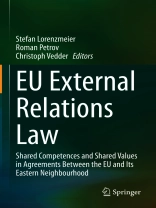The book covers contributions from 18 authors from different countries and analyses the recent case law of the ECJ on the external competences of the European Union. It deals with the impact of EU values on its relations with the Eastern neighbouring countries. The first part focuses on the evolution and current challenges of the external actions of the European Union, while the second part presents the EU cooperation with its Eastern neighbourhood and Eurasia. The book addresses the Association Agreements with the countries of the Eastern Partnership with its Eastern neighbourhood and Eurasia, the enhanced Partnership Agreements in the Eastern neighbourhood and post-Soviet area, and the current and future contractual relations with Eurasian Economic Union and its member states.
Tabla de materias
Chapter 1. Intoroduction /Lorenzmaier).- Part A: Evolution and Current Challenges of the External Action of the Union: From Shared Competences to Shared Values.- Chapter 2. New Challenges for The Union’s Treaty Making Powers and Common Values in Implementing Its Agreements (Müller-Graff).- Chapter 3. From ERTA to Singapore – and Beyond (Vedder).- Chapter 4. Exclusive and Shared Competences after the Singapore Opinion of the European Court of Justice – 2/15 Revisited (Lorenzmaier).- Chapter 5. Mixed Agreements after ECJ-Opinion 2/15 on the EU-Singapore Free Trade Agreement (Kumin).- Chapter 6. The EU-Swiss Sectoral Approach Under Pressure – Not Least Because of Brexit (Tobler).- Chapter 7. The Ratification Saga of the EU-Ukraine Association Agreement: Some Lessons for the Practice of Mixed Agreements (van Elsuwege).- Part B: EU Cooperation with its Eastern Neighborhood and Eurasia: Shared Values v. Closer/Remote Integration .- Chapter 8. Challenges of EU-Ukraine AA’s Effective Implementation into the legal order of Ukraine (Petrov).- Chapter 9. Impact of the EU-Georgia Association Agreement on the Legal Order of Georgia (Gabrichidze).- Chapter 10. Principles and Values of Fair Competition in the EU and its Association Agreements with Ukraine, Moldova and Georgia (Smyrnova).- Chapter 11. The EU-Kazakhstan Enhanced Partnership: An Overview and Evaluation (Kembayev).- Chapter 12. - EU-Armenia Comprehensive and Enhanced Partnership Agreement: A New Instrument of Promoting EU’s Values and General Principles of EU Law (Khvorostiankina).- Chapter 13. Pork, Peace and Principles: The Relations between the EU and the Eurasian Economic Union (Dragneva).- Chapter 14. The EU and Russia: Old Legal Grounds for New “Selected Engagement” Relations (Kalinichenko).- Chapter 15. The EU and Belarus. Current and Future Contractual Relations (Karliuk).- Chapter 16. Conclusion (Lorenzmaier/Petrov).
Sobre el autor
Dr. Stefan Lorenzmeier, LL.M. in EC Law (Leiden), is a senior researcher at the University of Augsburg, Germany. His research and teaching focus on EU law, public international law, EU external relations law and water law. He provides consultancy to parliaments and media. He is the author and co-editor of Europarecht, 5th ed., 2016; Völkerrecht, 3rd ed., 2016; Europarecht in Fällen, 7th ed., 2020; Recht und Realität, 2017; Contemporary Issues of Human Rights Protection, 2018; and Zeit und internationales Recht, 2019.
Prof. Dr. Roman Petrov is Jean Monnet Chair in EU Law and Head of Jean Monnet Centre of Excellence in EU Studies at the National University of Kyiv-Mohyla Academy, Ukraine. He has conducted research as Max Weber Fellow at the European University Institute in Florence (Italy) and has been awarded visiting fellowships at the University of Heidelberg (Germany), University of Oxford (UK), Ghent University (Belgium), Augsburg University (Germany) and Uppsala University (Sweden). His research focuses on EU law, EU external relations law, approximation and harmonisation of legislation in the EU and legal aspects of regional integration in the post-Soviet area. He provides consultancy to the Parliament, the Constitutional Court of Ukraine and the Ministry of Justice of Ukraine. Prof. Dr. Roman Petrov is co-editor of R. Petrov, P. Van Elsuwege (ed.), Post-Soviet Constitutions and Challenges of Regional Integration: Adapting to European and Eurasian Integration Projects, 2017, and R. Petrov, P. Van Elsuwege (ed.), Legislative Approximation and Application of EU Law in the Eastern Neighbourhood of the European Union: Towards a Common Regulatory Space?, 2014, and author of R. Petrov, Exporting the acquis communautaire through EU External Agreements, 2011.
Prof. em. Dr. jur. Christoph Vedder is former chair for constitutional law, public international law and European law as well as sports law at the University of Augsburg, Germany. He is also former dean of the Law School and member of the University Board. He taught at various universities in Germany and abroad, such as Southwestern Law School, Los Angeles, USA; Saarland University, Saarbrücken, Germany; Foreign Trade University in Hanoi, Vietnam; and University of Stavanger, Norway. His research and writing centres on EU Law in general – with a special emphasis on EU foreign relations, relationship between German law and Union law, constitutional requirements for EU membership, intra-federation relations, international dispute settlement and arbitration, and international sports law. He is co-editor of Vedder/Heintschel von Heinegg (ed.), Europäisches Unionsrecht: EUV, AEUV, GRCh, EAGV, Kommentar, 2nd ed., 2018; Arnesen/Fredriksen/Graver/Mestad/Vedder (ed.), Agreement on the European Economic Area: A Commentary, 2018; and Hummer/Vedder/Lorenzmeier (ed.), Europarecht in Fällen, 7th ed., 2020.












